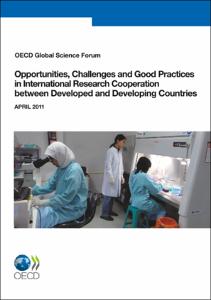| dc.date.accessioned | 2022-02-23T18:00:55Z | |
| dc.date.available | 2022-02-23T18:00:55Z | |
| dc.date.issued | 2011 | |
| dc.identifier.citation | OECD Global Science Forum (2011) Opportunities, Challenges and Good Practices
in International Research Cooperation between Developed and Developing Countries. Paris, France, Organisation for Economic Co-operation and Development, 20pp. DOI: http://dx.doi.org/10.25607/OBP-1723 | en_US |
| dc.identifier.uri | https://repository.oceanbestpractices.org/handle/11329/1874 | |
| dc.identifier.uri | http://dx.doi.org/10.25607/OBP-1723 | |
| dc.description.abstract | This report of the OECD Global Science Forum describes issues and options that deserve the attention of
scientists and administrators in industrialised countries and in developing countries, as they seek to design,
initiate and manage collaborative research programmes and projects that include both scientifi c and development
goals. The report identifi es good practices and new ideas, and presents options for concrete actions, compiled
during the course of the Global Science Forum project, which included a data-gathering and analysis phase, and
culminated in a workshop held in Pretoria, South Africa, in September 2010.
Links between science policy and the mechanisms of development aid already exist in some countries. Offi cial
Development Assistance (ODA) has traditionally been used mainly to provide technical assistance, but there
are now new motivations and opportunities to support scientifi c collaboration for developmental goals, and to
strengthen research capacity, especially in the developing countries. In recent years, a number of countries and
private organisations have assigned a higher priority to global issues, have put more emphasis on collaborative
research, and have moved beyond traditional technology transfer. In the industrialised countries, scientists
and policy makers increasingly turn to countries in the developing world as desirable and even crucial partners
who can provide a wide range of expertise, resources, and other benefi ts, from natural research sites to future
commercial markets for high-technology products. Meanwhile, a growing number of developing countries are
building and enhancing research capacity to create and utilize new knowledge that is essential for their economic
growth, and for dealing with the local effects of global-scale problems in domains such as health, food production,
or environmental protection. This OECD report is meant to facilitate international cooperation, to build confi dence
and trust between scientists and administrators, and to enhance ownership of research results by all participants. | en_US |
| dc.description.sponsorship | OECD | en_US |
| dc.language.iso | en | en_US |
| dc.publisher | Organisation for Economic Co-operation and Development (OECD) Global Science Forum | en_US |
| dc.title | Opportunities, Challenges and Good Practices in International Research Cooperation between Developed and Developing Countries. | en_US |
| dc.type | Report | en_US |
| dc.description.status | Published | en_US |
| dc.format.pages | 20pp. | en_US |
| dc.contributor.corpauthor | OECD | en_US |
| dc.contributor.corpauthor | Global Science Forum | |
| dc.publisher.place | Paris, France | en_US |
| dc.subject.parameterDiscipline | Administration and dimensions | en_US |
| dc.description.currentstatus | Current | en_US |
| dc.description.eov | N/A | en_US |
| dc.description.methodologyType | Reports with methodological relevance | en_US |
| obps.resourceurl.publisher | https://www.oecd.org/sti/inno/47737209.pdf | |
 Repository of community practices in Ocean Research, Applications and Data/Information Management
Repository of community practices in Ocean Research, Applications and Data/Information Management
